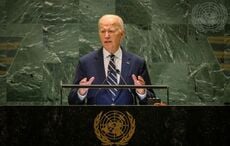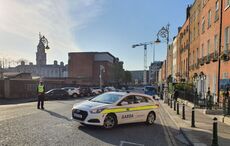For the full timeline of events leading up to Adams' questioning in the Jean McConville case, scroll down the page. For updates on the case as of Friday morning, watch this space:
3:00 pm. PSNI has announced they will hold Adams 48 hours longer for further questioning. In a closed-door hearing, a judge granted approval for his time of detention to be extended.
"Detectives from PSNI Serious Crimes Branch investigating the abduction and murder of Jean McConveille in 1972 have been granted an extra 48 hours to interview the 65-year-old man who was rrested in connection with the investigation on Wednesday," a spokesman said.
2:30 pm. The first description of the cell where Adams is to be held into the weekend has emerged, courtesy of the Belfast Telegraph. The move by PSNI to hold Adams for further questioning means he will be spending at least 24 more hours in 'a cramped, windowless cell with a seatless toilet.'
Adams is being held in the Serious Crimes Suite at a PSNI station in Co. Antrim.
"Adams would have spent last night sleeping on a steel-framed, wall-mounted bed with a blue plastic foam mattress. Spring mattresses are not permitted due to the risk of self-harm by suspects," the Telegraph reports.
"The sparse rooms in the suite have no windows and a seatless toilet positioned in the corner.
"A security camera is mounted on one wall for staff to constantly monitor the behaviour of those inside. Officers can also keep watch through a small peephole in the cell door."
11:00 am. PSNI have set aside a 2:30 pm GMT court appointment to apply to keep Gerry Adams for questioning over the weekend.
In response to this news, Deputy First Minister of Northern Ireland Martin McGuinness gave a brief press conference in which he stated "Yesterday I said that the timing of the arrest of Gerry Adams was politically-motivated. Today's decision by the PSNI to seek an extension confirms me in my view."
"There is a cabal within the PSNI who have a different agenda, a negative and destructive agenda to both the peace process and to Sinn Féin."
He stated Sinn Féin had been told this by "very senior members of the PSNI" who had coined the phrase the 'dark side'.
"Am I angry? Yes I am, but it's a very controlled anger," he said.
He gave no guarantees of continued support for the police and said that was dependent on Adams case being resolved
"If it doesn't, we will have to review that situation."
British Prime Minister David Cameron spoke with McGuinness and with First Minister Peter Robinson, asserting that the arrest was a criminal matter and was not politically motivated.
"There’s been absolutely no political interference in this issue,” he stated. “We have independent policing authorities, independent prosecuting authorities – those are vital parts of the free country and the free society we enjoy today.”
Cameron is said to be in frequent contact with Stormont, Leinster House and the White House.
Taoiseach Enda Kenny noted the escalating international attention the arrest is receiving.
“This is an issue where a high-profile citizen is being questioned about his knowledge or any information he may have about Jean McConville and her murder and disappearance.
“And I expect Gerry Adams to give his answers in full, as he has a duty and responsibility to do. It’s a notorious murder, and the eyes of the world are on Ireland because of the personalities involved."
-----
In brief
Gerry Adams, the president of Sinn Fein and a TD (parliamentary representative) for County Louth, was arrested on Wednesday for questioning in connection with the 1972 IRA kidnapping and murder of Belfast mother of 10 Jean McConville.
Since presenting himself for arrest, he has been in police custody at a station in County Antrim, where he is being questioned by detectives from the Serious Crimes Unit of the Police Service of Northern Ireland (PSNI).
Legally, he can be held until Friday evening, at which point the PSNI must secure approval to have the time of detention extended.
As outlined in a statement released before his arrest, Adams submitted to the questioning by prior arrangement. PSNI’s decision to question Adams comes on the heels of aiding and abetting charges filed last month against former IRA officer Ivor Bell in connection with McConville’s murder.
Following Bell’s arrest, Adams said “What happened to Jean McConville was a terrible injustice. I was not involved in any part of it. If the PSNI wish to talk to me on this matter I am available to meet them. I have asked my solicitor to contact them.”
Timeline of events
Those without prior knowledge of the case are likely wondering why Adams is only being questioned now, over 40 years after the crime, and why this particular murder, out of all the many killings perpetrated by both sides during the Troubles, is in focus.
The following is an outline of the chain of events, starting with McConville’s murder and ending with Adams’ arrest.
1972 – Jean McConville disappears. McConville, born Jean Murray, was born and raised in a Protestant family in East Belfast, but converted to Catholicism when she married Arthur McConville, a former member of the British Army. He died of cancer in 1971, leaving McConville as a widowed mother of 10.
In December 1972, a few days before Christmas, McConville was abducted by the IRA from her home in West Belfast, interrogated, and killed. Her body was then buried across the border, on Shelling Beach in Co. Louth. Some accounts say she was suspected by the IRA of being an informant, while others maintain that her only 'transgression' was once offering help to a wounded British soldier.
1999 – The IRA admit to McConville’s disappearance and murder. Following the 1998 Good Friday Agreement, new information emerged from both sides about those who disappeared during the Troubles. In 1999, the IRA admitted to killing McConville and passed on information about the location of her body, which searchers were unable to find.
2001 – Boston College begins oral history project on The Troubles. The college, an institution with a strong Irish/Irish American background, put its support behind the project, which began that year as the brainchild of Paul Bew, a Northern Irish historian, and Ed Moloney, previously a journalist in Northern Ireland.
The aim of the project, run by Moloney and Anthony McIntyre, a researcher and former IRA member, was to collect accounts of The Troubles from key figures on both sides. All of the interviews were conducted under the provision that no transcript or recording would be released until after the interviewee’s death. In all, they would speak with 26 former members of the IRA and 20 former Loyalist dissidents.
2003 – Jean McConville’s body is found. A storm on the night of August 26 washed away a portion of the parking lot at Shelling Beach in Co. Louth, revealing McConville’s corpse, which was discovered the following day by a passerby. A post-mortem performed on the body revealed that McConville had been shot in the back of the head. A further investigation in 2006 concluded that there was no evidence that she had been an informant nor were there any concrete leads as to the identities of her killers.
2008 – Brendan Hughes dies. Hughes, a commanding officer in the IRA and PIRA, was one of the subjects interviewed for the Boston College oral history project. It was recently revealed that at one point in his interview Hughes said, regarding McConville, "There's only one man that gave the order for that woman to be executed. That man is now the head of Sinn Fein. I did not give the order to execute that woman. He did."
2010 – Ed Moloney publishes book, Dolours Price talks to media. Based on the interviews with Hughes and with Loyalist David Ervine, Moloney published a book titled “Voices From the Grave: Two Men’s War in Northern Ireland.” Billed at the time as “the inaugural publication of the Boston College IRA/UVF Oral History Project,” it included Hughes’ allegation that Adams had ordered McConville’s Murder.
Also in 2010, Old Bailey bomber Dolours Price, who had also been interviewed for the Boston College project, made a number of statements alleging Adams’ involvement in McConville’s killing. It was noted at the time that both Price and Hughes, before his death, strongly disagreed with the role Sinn Fein and Gerry Adams had taken in the Peace Process.
2011 – PSNI issues subpoena to Boston College. Under the Treaty of Mutual Assistance in Criminal Matters, the PSNI, through the US Attorney, moved to subpoena the interviews with Hughes and Price from Boston College, which, along with Moloney and McIntyre, decided to fight the subpoena. In August, PSNI issued another subpoena, this time for all of the interviews with any information relating to Jean McConville.
2012 – District Court rules in PSNI’s favor. In January 2012, after US courts had reviewed 176 transcripts, Massachusetts District Court Judge William Young ruled that 85 of the transcripts should be turned over to the PSNI in connection with the McConville case.
Voices ranging from Moloney to then-Massachusetts Senator John Kerry expressed concern that the release of the tapes could jeopardize the peace process and bring potential harm to those interviewed. Boston College continued to appeal the subpoena.
2013 – Dolours Price dies. Following her death on January 23 in Dublin, Moloney and McIntyre were granted a final stay to retain the transcripts as they prepared an appeal to the US Supreme Court. Their petition was heard by the court and denied on April 15.
In May, the US First Circuit Court of Appeals ruled that 11 interviews were to be handed over to PSNI for review.
March 2014 – Ivor Bell arrested and charged. Bell, a former commanding officer in the IRA, now 77, was arrested and brought in for questioning based on information in the oral history transcripts in the PSNI’s possession. He was charged with aiding and abetting in McConville’s murder, to which he has pled not guilty. Five other individuals are believed to have been questioned since then.
Following Bell’s arrest, Adams, who has consistently denied any involvement in McConville’s murder, issued a statement criticizing the Boston College oral history project and the chain of events in its wake.
“It is clear that the so-called Boston Oral History project is an entirely bogus, shoddy and self-serving effort by those involved,” he said.
“The idea for this project originated with Paul Bew, an advisor to David Trimble and was taken up by Ed Moloney and Anthony McIntyre who conducted the interviews. Both are vitriolic critics and opponents of the Sinn Féin peace strategy, of me in particular and of Sinn Féin and its leadership.”
April 29, 2014 – Gerry Adams arrested for questioning. Per a pre-arragement with PSNI, Adams is being held for questioning in Co. Antrim.
Following the arrest, one of McConville's children, Michael, has told the media that he knows the identity of his mother's killers, but that he is too afraid of the potential consequences of naming names.
One of McConville's daugters, Helen McKendry, told the BBC she is "ready to name names."
She said: "I do not fear the IRA anymore. I will happily give the names that I know to the police. . . What are they going to do to me? They've done so much to me already in the past 42 years, what are they going to do? Come and put a bullet in my head? Well, they know where I live."




Comments